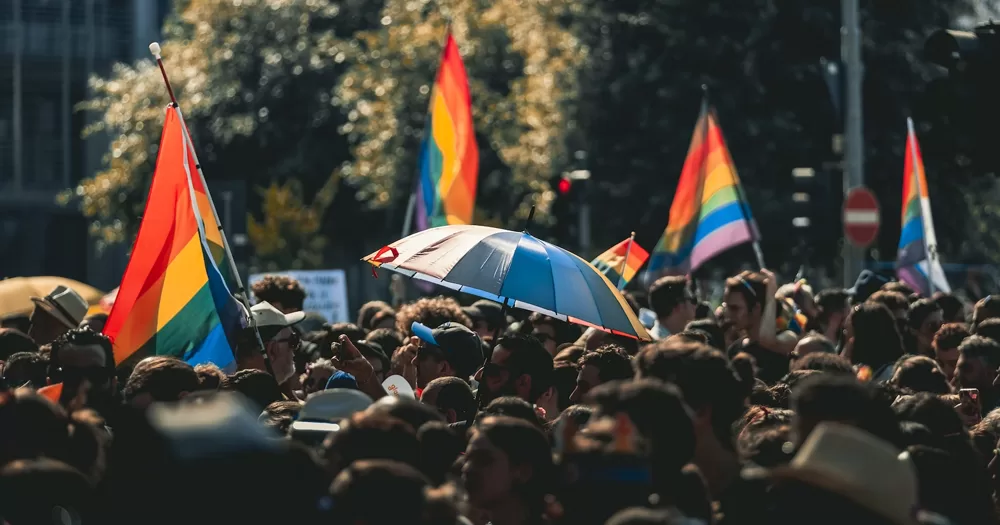Irish writer Colin Daly reflects on the true meaning of community and what it is that brings us all together.
I remember several years ago, a gay character on the BBC soap EastEnders, stroppily querying what the LGBTQ+ community was. This rather annoyed me at the time because, to me, the LGBTQ+ community was the sum of all LGBTQ+ people and should not be insulted or diminished by anyone, let alone a gay person, albeit a fictional one.
In these days of identity politics, it may be more important than ever to have the support of a community. But is it global or local or restricted to our friends and acquaintances? And does the meaning of community depend on the time or age, the moral or religious landscapes or the zeitgeist, as it were? If we don’t believe in an LGBTQ+ community, then where does that leave us? As a collection of disparate individuals with no support group and nowhere to seek help with our group-specific problems?
It was creating groups of individuals rather than disconnected ones that helped secure LGBTQ+ rights in Ireland in the 70s and 80s.
Patrick McDonagh tells us that “In seeking to forge alliances with other organisations, activists argued that gay and lesbian individuals were among the largest unrecognised oppressed minority groupings in Ireland. Presenting gay and lesbian individuals as a social minority (rather than as unconnected individuals) allowed activists to argue that they were being denied basic human rights.”
This, to me at least, is a clear indication that LGBTQ+ people were and are, in fact, a community of individuals with a common cause. In the “old” days, or golden days for me, the early eighties, there was a real sense of this community based around the Hirschfeld centre. It was where LGBTQ+ people went to ‘come out’, or to laugh, or cry on shoulders, or celebrate life’s landmarks. It was a true community centre. But with its demise and the commercialisation of the scene, has this community spirit diminished? Indeed, has it disappeared completely?
I don’t believe it has. I believe that it is still alive and well. In Edmund Lynch’s film Did they notice us?, an interviewee states at that “The
community exists because of our desire for each other whether it’s for love or sex or whatever”. Surely there is more to it than that? A community may be cemented by a certain amount of desire but desire commonly wanes and withers away. The sense of community
still remains because desire qua desire is usually for a one-to-one relationship but within an empathetic and supportive population.
So what is the true meaning of community? I would maintain that it is our “gayness” that creates our community and that being LGBTQ+ in a spirit of adversity against church, government, hate groups, etc pulls the bonds ever tighter so that we are not defenceless against these agencies. Within the wider LGBTQ+ community, we have smaller communities whose members are glued together by common interests, but in the main, I would say that in our LGBTQ+ community, we have a plurality of specific monocultures.
We have bears, twinks, rice queens, muscle queens, subs, doms, lipstick lesbians, femmes, butch lesbians, the list goes on. Being a member of one of these groups gives one a further, more molecular sense of identity and community within one’s peers. It creates a further layer of community within the disparate layers of our cultures.
Of course, LGBTQ+ people are also part of the wider national and global community of people, per se, and are themselves, separately from their sexuality and gender identity, further categorised by religion, ethnicity, political affiliation, hobbies, career choices, etc. So in this sense, we are all part of a larger community of sorts, irrespective or otherwise, of our conscious awareness of it.
What we need within any community, particularly one as vulnerable to physical assault and illogical hatred as the LGBTQ+ community, is the feeling not just of belonging but of being part of a greater, caring and protective group. We need to be empowered by our membership of the LGBTQ+ community to live our lives openly whilst, in return, embracing an unwritten form of social contract that pertains specifically to it. For example, it is an absolute anathema to “out” someone against their will and to do so risks excommunication from the community. It is on issues like this that we require the steadfast support of our peers.
Returning to the first paragraph, I would contend that an LGBTQ+ community does exist. All LGBTQ+ people are a part of it irrespective of religion, politics or anything else. The prevailing zeitgeist will perhaps affect our interpretation of our social contract within and without the
LGBTQ+ community, but we are all better off because of our community and the concomitant cultures and freedoms that it enables.
© 2023 GCN (Gay Community News). All rights reserved.
Support GCN
GCN is a free, vital resource for Ireland’s LGBTQ+ community since 1988.
GCN is a trading name of National LGBT Federation CLG, a registered charity - Charity Number: 20034580.
GCN relies on the generous support of the community and allies to sustain the crucial work that we do. Producing GCN is costly, and, in an industry which has been hugely impacted by rising costs, we need your support to help sustain and grow this vital resource.
Supporting GCN for as little as €1.99 per month will help us continue our work as Ireland’s free, independent LGBTQ+ media.
